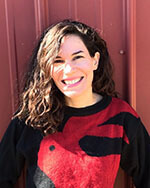|
www.HealthyHearing.com |
Being Deaf gives audiologist a unique insight on hearing loss
Contributed by Madeleine Burry Audiology isn’t Sarah Sparks’s first career. But her previous one “did not feel to me as though it was my permanent calling in life,” she says. Time spent soul-searching for more fulfilling work led her to audiology. 
the cochlear implant electrode array sits inside the cochlea during a video session with a patient. It’s probably no coincidence that Sparks landed on this field: She’s deaf herself. “I was thinking about how I had never seen an audiologist myself who knew enough ASL to communicate with me in ASL,” says Sparks, a graduate of Gallaudet University’s Doctor of Audiology (Au.D.) program. It’s meaningful when an audiologist sees someone who can communicate with them fully in sign language, she says. Plus, Sparks is fascinated with the vestibular system (aka, the balance system in your inner ear). Like many people who are deaf, she has reduced function in her vestibular organs, and she has big questions about it: How does vestibular loss affect children differently? How does it relate to vision? Language development? 'Make a real difference'“Over time, it became clear to me that audiology would be a career pathway where I would be able to explore those questions and make a real difference in some of those issues, too,” she says. Sparks has a multifaceted career: She provides diagnostic cochlear implant and hearing aid services through a part-time role at a clinic. She also has a business of her own—Audiology Outside the Box—where she provides counseling and rehab services. “Audiology appointments can happen really quickly, especially in fast-paced clinics,” she says. People leave with unanswered questions, or feeling confused and overwhelmed. By meeting with her, people have an opportunity to ask all their questions, dig into issues with devices, and so on. Plus, she’s pursuing a second doctoral degree, with a long-term goal of being a faculty member in an audiology program and doing research (as well as continuing to see patients). Her unique background is an assetSparks has progressive hearing loss—that is, she wasn’t born deaf, but lost her hearing over time. “I'm not exactly sure of when that began,” she says, noting there weren’t audiologists where she grew up. Deaf and hard of hearing audiologists have distinct advantages, Sparks says.
“We're able to provide empathy for the people that we're working with,” Sparks says. It’s also meaningful for parents of deaf or hard of hearing children, who may be concerned or uncertain about their child’s future or quality of life, she says. “It can really challenge their worries about what a life might be like as a deaf or hard of hearing person.” Plus, sometimes there’s no substitute for insights drawn from lived experience. Sparks can share examples of communication techniques and technologies that have personally worked for her. “There are certain things that I have found that I think of that my colleagues don't necessarily think of when making recommendations to clients,” Sparks says. For instance, with a patient who had tremendous earwax and moisture build-up in his hearing aids, she went beyond a cookie-cutter recommendation to use a drying kit overnight. Instead, she suggested he try an electronic hearing aid dryer that she’d found effective herself. That did the trick—the patient’s hearing aids function better now. Bridging both worlds“I was a hearing aid user for several years before I started using cochlear implants,” Sparks says. As Sparks notes in her Twitter bio, cochlear implants and sign language are not opposites. But cochlear implants can be contentious in the Deaf community. Before studying to become an audiologist at Gallaudet University, Sparks thought of these devices as being for people who want to be hearing—and not part of Deaf culture. But on campus, she met people who signed and also had cochlear implants. They were “equally part of Deaf culture and of hearing communities,” adeptly integrating both aspects in their lives, she recalls. 'Really happy to be a cochlear implant user'With that in mind—and thinking of her challenges hearing young children and people with accents—she reconsidered. “It was a very difficult decision for me and I really struggled with it for a long time. But after several months of adjusting and dealing with the emotional aspect of it, as well as the auditory rehab piece, I became really happy to be a cochlear implant user,” Sparks says. Having the implants makes it easier for her to hear and communicate with English speakers during audiology appointments, she says. And at home with her spouse, she sometimes opts to speak in English, and sometimes in ASL. A message to people who are deaf or hard of hearing“I would encourage deaf and hard of hearing people who are interested in audiology as a career path to consider it seriously,” Sparks says. It can be challenging, she says. Fortunately, resources are available for support, such as the Association of Audiologists with Hearing Loss. “If this is something that you want to pursue, it can be a very rewarding thing," she says. "And actually getting through to the end of it is worth it." More on ASL and Deaf cultureMadeleine Burry
|
Featured clinics near me
Earzlink Hearing Care - Reynoldsburg
7668 Slate Ridge Blvd
Reynoldsburg, OH 43068

Find a clinic
We have more hearing clinic reviews than any other site!


 Madeleine Burry is a Brooklyn-based freelance writer and editor. She's written about health for several online publications, including Women's Health, Prevention, Health, Livestrong and Good Housekeeping. You can follow her on Twitter @lovelanewest.
Madeleine Burry is a Brooklyn-based freelance writer and editor. She's written about health for several online publications, including Women's Health, Prevention, Health, Livestrong and Good Housekeeping. You can follow her on Twitter @lovelanewest.